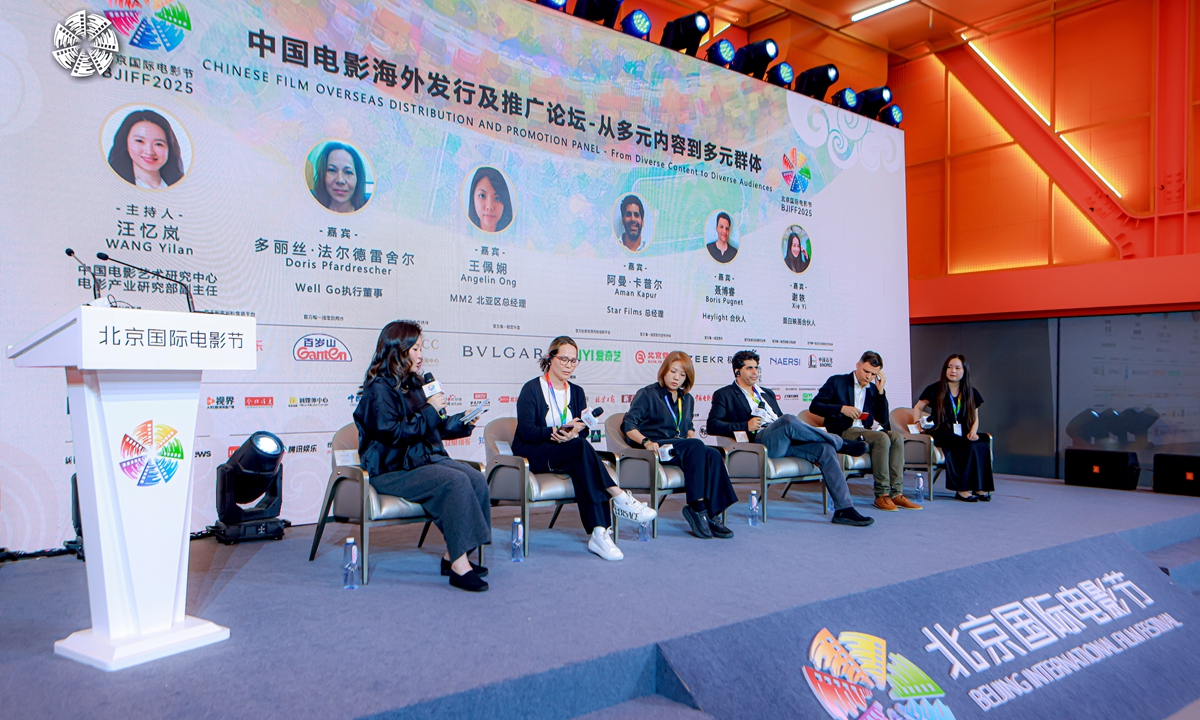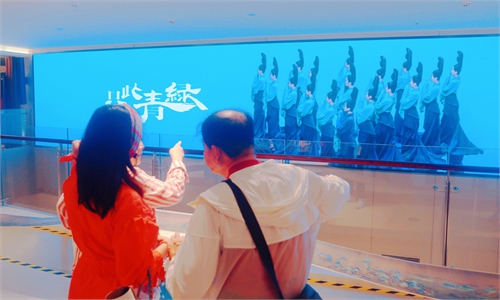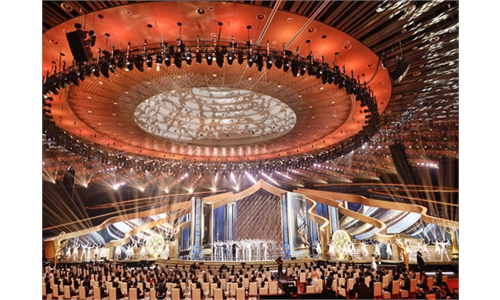ARTS / FILM
Strength of Chinese cinema on display at Beijing film fest
Uniqueness key to overseas expansion: experts

Experts take part in the Chinese Film Overseas Distribution and Promotion Panel: from Diverse Content to Diverse Audience forum on April 20, 2025 during the ongoing Beijing International Film Festival (BJIFF) in Beijing. Photo: Courtesy of the BJIFF
As part of the ongoing Beijing International Film Festival (BJIFF), a landmark forum on the global promotion of Chinese cinema was held on Sunday, shining a spotlight on one of the most important and challenging topics facing Chinese cinema: going global.The forum, titled "Chinese Film Overseas Distribution and Promotion Panel: from Diverse Content to Diverse Audience," collected voices from international distribution companies and film market institutions across Europe, North America and Asia as global market attention toward Asian films continues to rise but only a select few Chinese productions have successfully transitioned to wide overseas releases or long-term box-office performance.
Industry experts shared insights on overseas audience preferences and cultural interpretation for Chinese films, strategies for converting festival exposure into distribution deals, and international sales models for independent productions.
David Yates, the British filmmaker best known for creating box-office miracles with Harry Potter and Fantastic Beasts and Where to Find Them series, told the Global Times the importance of staying true to one's unique voice and vision, which he said is a strength of Chinese films when it comes to reaching a global audience.
Yates, who is also part of the international jury for the 15th BJIFF's Tiantan Award, highlighted that when filmmakers remain authentic to their stories, their work can resonate globally.
He also noted the importance of capturing universal human experiences such as pain, love, dissolution and optimism, which are essential for connecting with audiences worldwide.
Xie Yi, a forum guest and the distribution executive at FaceWhite Co., LTD who facilitated the Japanese releases of Chinese animated films Ne Zha 2 and I Am What I Am 2, told the Global Times on Sunday that films' alignment with Japanese aesthetic preferences remains paramount when introducing Chinese cinema to Japan.
"Japanese audiences particularly resonate with slice-of-life narratives," she said.
Noting operational differences, Xie said that Japanese distributors typically schedule film releases six months in advance of international releases, while Chinese counterparts increasingly pursue simultaneous premieres to cater to overseas Chinese communities.
In terms of market strategies, Xie said the Japanese market relies more on traditional media promotion while China has a more diversified digital outreach.
"China's film industry is becoming more proactive in global marketing campaigns - this strategic expansion reflects our growing confidence in international markets," she said.
She also highlighted the cross-cultural creative exchange.
"Many Chinese animators grew up influenced by Japanese anime techniques, but when Ne Zha 2 and I Am What I Am 2 premiered here, many Japanese industry luminaries like Makoto Shinkai expressed amazement at China's refined animation craftsmanship," Xie said.
Cedric Behrel, a distributor at Trinity CineAsia specializing in Chinese film distribution in Europe, told the Global Times in an exclusive interview that they prioritize two film categories: commercial blockbusters with box-office potential and festival-oriented productions with prospects for critical acclaim.
Recalling the distribution of Ne Zha 2 in the Europe film market, Behrel said the film represents an artistic milestone in animation.
The local audiences were amazed by the film and strongly resonated with the story.
"China can make high-quality films. It's been very obvious. Cinemas are willing to give more space to Chinese films, and we've made a lot of progress in that sense," he said. "Now, it's a question of how appealing these films can be to an international audience. It's about how far a film can be localized to really talk to the audience."
Participants of the BJIFF Core Industry Forum on Saturday noted that there are plans to release an English-language version of Ne Zha 2 overseas.
On the short video section of the film festival, judge Rao Xueman, a Chinese best-selling novelist and screenwriter known for her "teenage-themed literature," told the Global Times on Sunday that many of the short video works were focused on artificial intelligence and other sci-fi themes, while the overall quality of these works created by the younger directors has improved.
She noted that the production and export of Chinese films and television shows targeting young audiences face challenges due to differing perspectives on youth between the current generation and previous ones.



